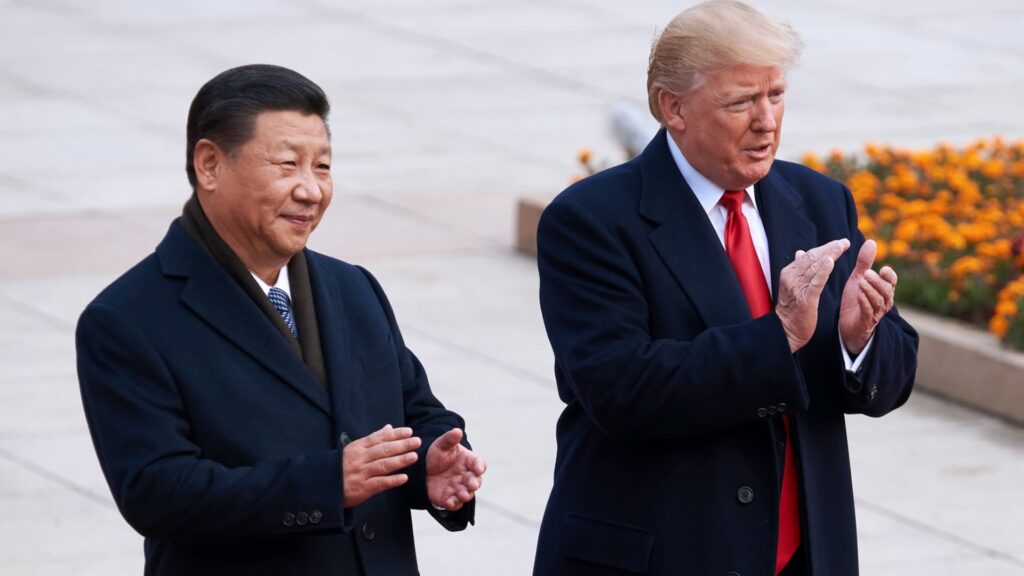Chinese President Xi Jinping and former U.S. President Trump in Beijing, China, 2017.
Artem Ivanov | TASS | Getty Images
BEIJING – Goldman Sachs said Donald Trump’s plan to impose 60% tariffs on Chinese goods could pose “significant downside growth risks” to China if he wins the U.S. presidential election.
Trump’s chances of becoming the next president increased after he survived an assassination attempt on Saturday and chose former critic J.D. Vance as his running mate two days later.
“Exports are a bright spot in China’s economy right now, and I think policymakers may want to be prepared,” Shan Hui, chief China economist at Goldman Sachs, told CNBC’s “Squawk Box Asia” on Tuesday.
“We’re seeing talk of tariffs not just in the United States but with China’s other major trading partners,” she said. “So this will not be a sustainable driver of China’s economic growth.”
The United States is China’s largest single country trading partner, while the European Union lags behind Southeast Asia as China’s largest regional trading partner. Trump raised tariffs on Chinese goods when he was president in 2018 and threatened to raise tariffs to 60% if re-elected this fall.

Citigroup said the contribution of goods exports to China’s real GDP growth in the second quarter of this year was the highest since the first quarter of 2022, when coronavirus restrictions limited domestic economic activity.
At the same time, Beijing’s vigorous development of high-end manufacturing has not been able to fully offset the impact of the downturn in real estate and consumption.
Treasury Secretary Yellen and other U.S. officials said China’s policies to enhance industrial capabilities and technological self-reliance have led to job losses in the United States.
Is China the “biggest threat”?
In his first interview since being elected Trump’s running mate, Vance told Fox News that China was the “real problem” for the United States and posed the “biggest threat,” not the war in Ukraine.
The Biden campaign criticized Trump’s choice, saying it was made on purpose “because Vance will do what Mike Pence will not do on January 6: relentlessly support Trump and his extreme MAGA agenda, even if it means breaking the law and regardless of the harm done to the American people.
On January 6, 2021, supporters of then-President Trump stormed the U.S. Capitol in an attempt to overturn the results of the 2020 presidential election.
Asked about Vance’s comments, Chinese Foreign Ministry spokesman Lin Jian told a daily news briefing on Tuesday, “We have always opposed making China an issue in the U.S. election.”
call for excitement
China’s economy grew by 4.7% annually in the second quarter, lower than economists’ expectations, and the growth rate in the first half of the year reached 5%. That has prompted some to call for more stimulus if the world’s second-largest economy reaches 5% growth for the full year.
Goldman Sachs’ Shan said the downside risks to a potential U.S. tariff increase under Trump mainly come from greater uncertainty and tighter financial conditions, as well as pressure on the yuan. She noted that the 2018 tariffs did not significantly weaken China’s exports to the United States
However, recent data suggests that trade has slowed. In the first half of the year, China’s exports to the United States grew slightly by 1.5%.
“Policymakers need to consider domestic demand and focus on factors that are more durable and sustainable for growth prospects,” Shan told CNBC on Tuesday.
If a 60% tariff were imposed, “that’s quite high and we think the macroeconomic impact would be quite significant,” she added.

So far, China has refrained from stimulus measures. China’s top leaders will convene the much-anticipated Third Plenary Session of the Central Committee of the Communist Party of China in Beijing this week, where they are expected to set long-term economic policy goals.
Citi analysts said on Monday that weak retail sales and disappointing second-quarter growth were not enough to convince Beijing to step up support for the economy.
“Policymakers are likely to tolerate short-term weakness amid structural shifts in the real estate sector,” analysts said. “More concerns about trade and foreign relations may also lead China to save policy space for the future.”
Citigroup expects China’s real GDP to grow by 5.0% this year.

China’s dollar-denominated exports grew 3.6% in the first six months of this year as global demand for Chinese goods has been better than expected in recent months.
“Manufacturing and infrastructure investment are likely to remain strong, and exports should remain at good levels [year-on-year] grow in [the third quarter]shipping orders may be loaded in advance [the second half of the year] Wang Tao, head of Asia economics and chief China economist at UBS Investment Bank, said in a report on Tuesday due to concerns about rising tariffs.
She said Chinese authorities may be reluctant to roll out major stimulus measures in the coming months to conserve resources in the face of a weaker economy and increased tariffs.
UBS expects China’s economy to grow by 4.9% this year.
Trump is a deal maker
However, not all analysts believe that Trump’s possible election as president would be detrimental to China.
Ben Harburg of Corevalues Alpha told CNBC on July 4 that he believed China was more likely to achieve “positive” trade results during Trump’s presidency, given the “transactional nature” of the former president.
“He’s a dealmaker and like any negotiator, he likes to set the bar low, set the price low and then work your way up,” the portfolio manager told “Signpost Asia.”
When talking about foreign policy, Harberger pointed out that another term for Biden also means continuing to impose tariffs and “intruding on China’s domestic problems”, which will not significantly improve the Chinese economy, nor will it significantly improve Sino-US relations.
He said Trump’s partnership with China would mean “more binary potential for positive outcomes for China.”
CNBC’s Sonia Heng reported from Singapore.

